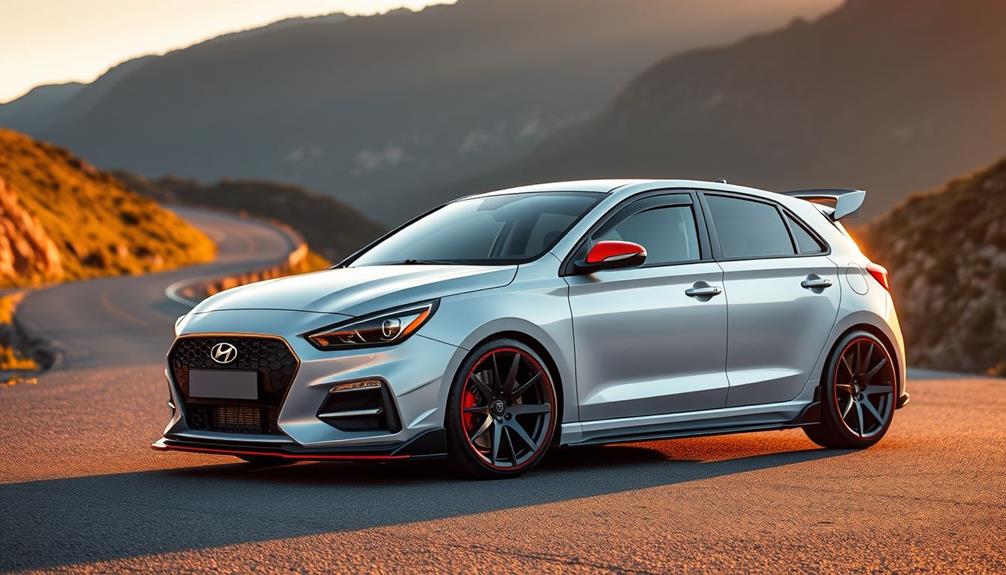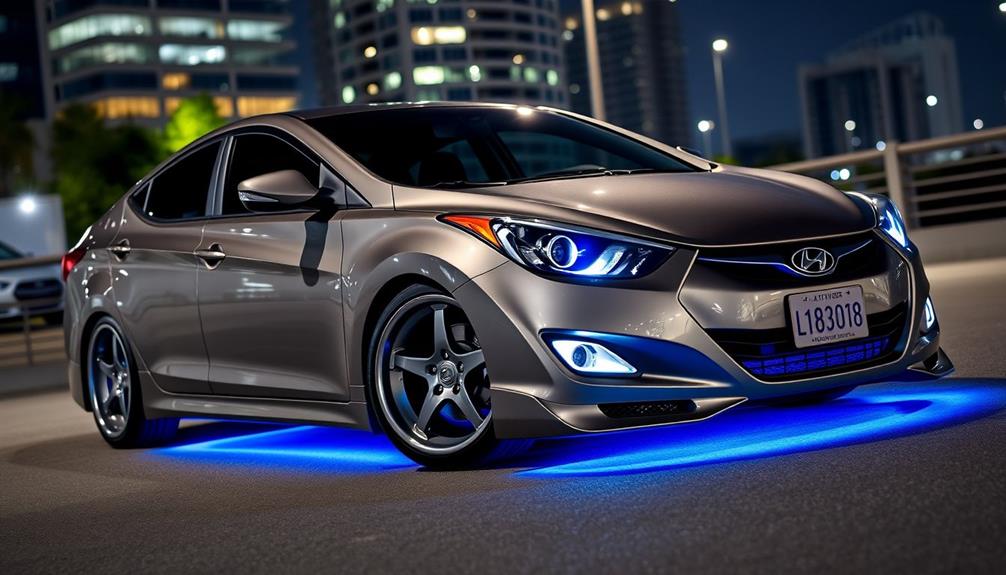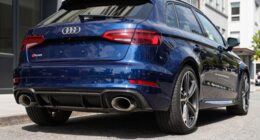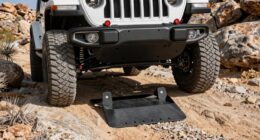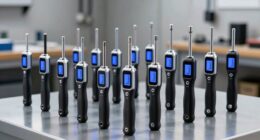Tuning your Hyundai Tiburon can turn it into a performance powerhouse. Start with a turbocharger—it can boost horsepower by up to 100%! A proper cooling system is essential to manage the extra heat generated. Don't forget about optimizing your air intake and exhaust systems; they'll improve airflow and combustion efficiency. Regular maintenance keeps everything running smoothly and helps avoid common engine issues. To maximize gains and guarantee reliability, careful budgeting and prioritizing upgrades is key. Keep going to uncover even more tips for making your Tiburon a performance icon.
Key Takeaways
- Turbocharging significantly increases horsepower and torque, making it the primary tuning choice for Hyundai Tiburons.
- Adequate cooling systems are crucial to prevent overheating and maintain engine reliability during high performance.
- Regular maintenance, including oil changes and inspections, is essential for sustaining performance upgrades and engine longevity.
- Upgrading exhaust and air intake systems enhances engine efficiency and complements forced induction for better combustion.
- Emerging turbo technologies and collaborations among manufacturers are driving innovative performance enhancements for the Tiburon community.
Current Upgrade Options
When considering current upgrade options for the I4 Hyundai Tiburon, you'll often find that turbo setups are the go-to choice, as there aren't any root-type superchargers available on the market.
Turbo systems provide substantial performance enhancements, notably boosting horsepower and torque when installed and tuned correctly.
Several brands offer turbo kits compatible with the I4 Tiburon, but installation complexity varies. If you're an experienced DIYer, some kits may be manageable, while others might require professional assistance.
You'll need to weigh your skill level against the kit's requirements to guarantee a successful upgrade.
Proper tuning is vital for maximizing the performance gains from your turbo setup. You can achieve ideal results by working with a skilled tuner who understands your specific setup.
Additionally, don't overlook the importance of adequate cooling systems; they're essential in preventing overheating and maintaining your engine's longevity.
Recent trends indicate a growing preference for turbocharging over supercharging in performance mods, making turbo systems increasingly popular among enthusiasts.
Turbocharged Systems

Turbocharged systems offer a thrilling way to elevate the performance of your I4 Hyundai Tiburon. By adding a turbo kit, you can experience a remarkable horsepower increase of 50-100%, depending on the specific kit and tuning you choose.
However, it's crucial to research various brands and their compatibility with your vehicle, as installation complexity can vary greatly based on your experience level.
Once you've installed a turbocharger, proper tuning becomes critical. This guarantees the ideal air-fuel mixture and engine efficiency, maximizing the performance gains from your forced induction setup. Neglecting tuning could lead to subpar performance or even engine damage.
Additionally, don't overlook the importance of adequate cooling systems when installing a turbocharger. Increased boost levels can raise engine temperatures, impacting reliability and longevity.
To prevent knocking and achieve the best efficiency and power output, use high-octane fuels. This attention to detail will help you unleash the full potential of your turbocharged Tiburon, transforming it into a true performance icon.
Embrace the thrill of forced induction and enjoy the exhilarating drive that comes with proper tuning and a well-executed installation.
Market Trends
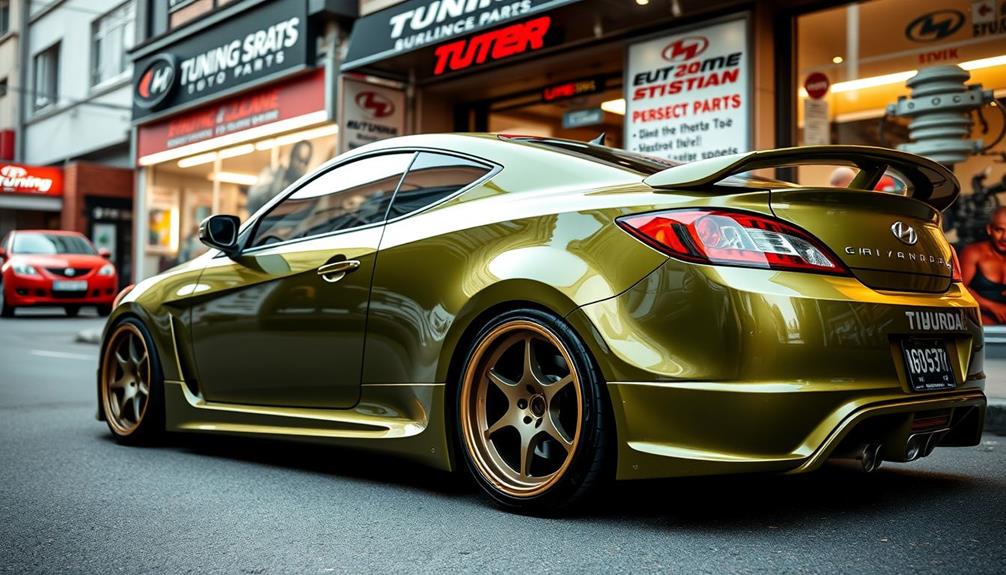
In recent years, the automotive market has shifted dramatically, with turbocharging emerging as the preferred choice over supercharging among performance enthusiasts. This trend highlights the growing consumer demand for performance upgrades, especially in vehicles like the Hyundai Tiburon. You'll notice that aftermarket performance parts are becoming increasingly popular, as enthusiasts seek to customize their rides for enhanced performance.
| Trend | Impact on Hyundai Tiburon |
|---|---|
| Turbocharging Dominance | Boosts performance potential |
| Rising Aftermarket Demand | Expands part availability |
| Innovation in Turbo Tech | Enhances tuning options |
As the aftermarket sector competes aggressively, you can expect a wider selection of parts tailored for your Tiburon. Innovations in turbo technology are on the horizon, driven by ongoing research and community feedback. This input from car enthusiasts plays a vital role in guiding manufacturers and developers, ensuring they create products that meet your evolving needs. By keeping up with these market trends, you'll be well-equipped to transform your Tiburon into a true performance icon.
Performance Considerations
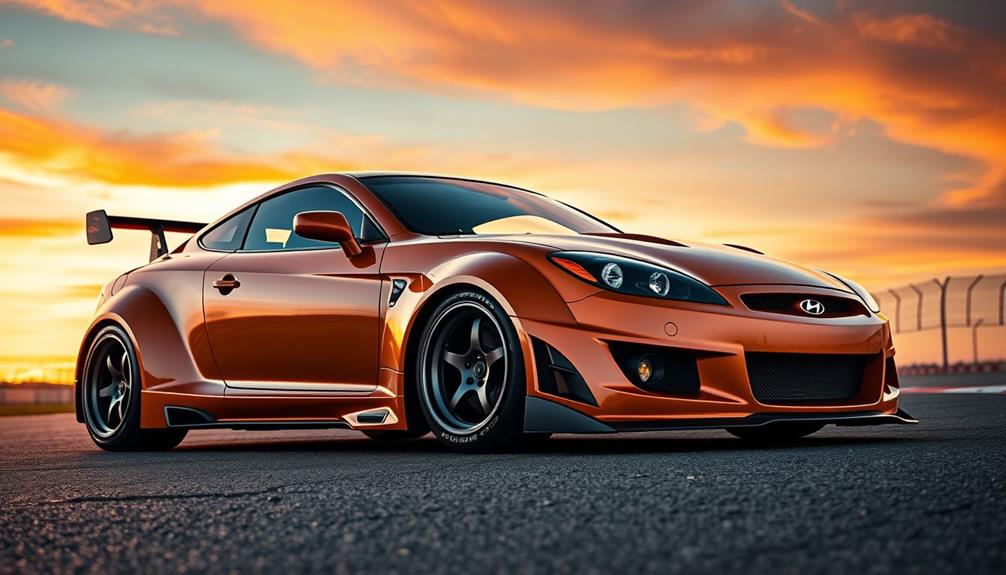
When tuning your Hyundai Tiburon, you need to pay close attention to boost levels, as they directly affect engine reliability.
Tuning your engine is essential to optimize performance and efficiency, ensuring you get the most out of your upgrades.
Don't forget about your cooling system; it's vital for maintaining safe operating temperatures during those high-performance drives.
Boost Levels Impact Reliability
Boost levels greatly influence the reliability of your Hyundai Tiburon's engine, and understanding this relationship is fundamental for any performance enthusiast. While increasing boost from turbocharging can notably enhance horsepower and torque, it also puts extra stress on engine components, which can affect long-term reliability.
To help you navigate these considerations, here's a quick overview of how different boost levels impact engine reliability:
| Boost Level | Engine Performance | Reliability Risk |
|---|---|---|
| Low (Stock) | Moderate increase | Minimal risk |
| Moderate | Noticeable gains | Moderate stress |
| High | Significant power boost | High risk of failure |
Proper engine tuning is critical when you raise boost levels. It guarantees ideal air-fuel ratios and prevents engine knock, which can lead to severe damage. The stock Beta engine in the I4 Tiburon can handle moderate performance upgrades but watch out—excessive boost can exceed its limits.
Also, effective cooling systems are fundamental at higher boost levels to prevent overheating. Regular maintenance, including oil changes and inspections, is essential for sustaining engine reliability when operating at elevated boost levels.
Engine Tuning Importance
Maximizing your Hyundai Tiburon's performance hinges on effective engine tuning, especially after making upgrades like turbocharger installations. Proper engine tuning is essential to optimize airflow, fuel delivery, and exhaust efficiency, guaranteeing you reap the full performance gains from your modifications.
When you install a turbocharger, the boost levels directly influence the engine's reliability and longevity. That's why careful calibration during tuning is necessary to prevent potential damage.
Additionally, the quality of fuel you use greatly impacts turbo performance and efficiency. Higher octane ratings can enhance your engine management strategy, making it important to evaluate fuel types during your tuning process.
Regular maintenance, including tuning adjustments, is required to sustain the performance improvements you've achieved through forced induction.
To reach competitive power levels in your Tiburon, you'll need an extensive tuning strategy that balances your modifications with the engine's durability and performance goals. By prioritizing engine tuning, you can guarantee that your Hyundai Tiburon not only performs well but also remains reliable for years to come, giving you the driving experience you desire.
Cooling System Necessity
A robust cooling system is indispensable for any Hyundai Tiburon equipped with a turbocharger. Increased boost levels generate extra heat, which can compromise your engine's reliability and performance. Upgrading your cooling system not only prevents overheating but also guarantees ideal operating temperatures during intense driving sessions.
| Upgrade Type | Benefits | Performance Impact |
|---|---|---|
| High-Performance Radiator | Enhanced cooling efficiency | Reduces risk of overheating |
| Quality Intercooler | Lowers intake air temperatures | Improves combustion efficiency |
| Regular Maintenance Checks | Prevents coolant leaks and failures | Reduces potential performance issues |
Investing in a well-designed intercooler is imperative; it helps maintain lower intake air temperatures, leading to better combustion and higher power outputs. Don't forget the significance of regular maintenance. Checking coolant levels and inspecting hoses can prevent performance issues and potential engine damage. With the right cooling system upgrades, your Tiburon can reach new heights of performance while guaranteeing longevity—so don't overlook this essential aspect of your tuning journey!
Future Developments
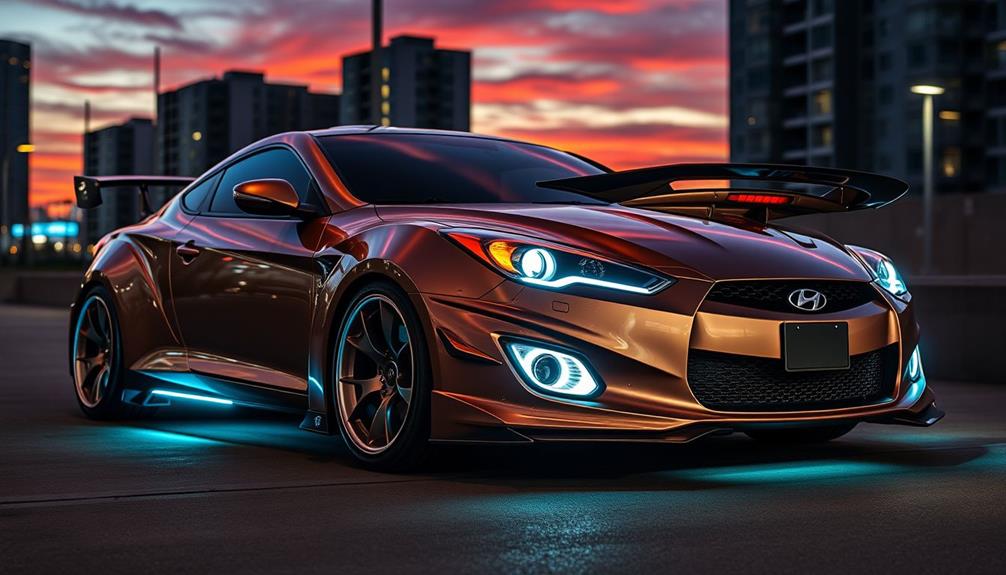
As you look ahead in the world of Hyundai Tiburon tuning, new turbo technologies are on the rise, promising improved efficiency and performance.
You're likely to see anticipated supercharger releases, alongside exciting collaborations between manufacturers and developers that could expand your upgrade options.
Keeping an eye on these developments will help you stay ahead in maximizing your car's potential.
Emerging Turbo Technologies
Turbo technologies are rapidly evolving, and you can expect to see significant advancements that enhance both efficiency and power output. Emerging turbo technologies are focusing on innovations like variable geometry turbines and electric assist systems, which improve responsiveness and minimize lag.
These improvements will allow your Hyundai Tiburon to deliver better performance across a broader RPM range, making your driving experience more exhilarating.
Research is also delving into new materials and manufacturing techniques to create lighter, more durable turbo components. This means your turbocharger can withstand higher temperatures and pressures without sacrificing reliability.
Furthermore, anticipated advancements in tuning software and engine management systems will enable you to achieve precise control over turbocharging dynamics, optimizing performance for various driving conditions.
Community feedback plays an essential role in shaping these future turbo technologies. As an enthusiast, your demands for greater customization options and integrated systems will drive innovation, helping to enhance the overall driving experience.
Keeping an eye on these developments will guarantee that your Tiburon remains at the forefront of performance and efficiency in the ever-competitive world of sports coupes.
Anticipated Supercharger Releases
While turbocharging has seen impressive advancements, the Hyundai Tiburon community is enthusiastic for new supercharger options to enhance performance. Currently, the market lacks Root Type superchargers for the I4 Tiburon, leaving you with limited choices and primarily relying on turbo setups.
The exit of Alpine Developments from the performance market hasn't helped, as their previous products left a negative impression.
Yet, there's hope on the horizon. Anticipated supercharger releases are generating buzz, with ongoing research and development efforts aimed at producing superior performance upgrades. The NGM's Enforcer supercharger project remains unfulfilled, but community feedback is essential in steering manufacturers toward the right direction.
Here are some aspects to look forward to in the upcoming supercharger developments:
- Innovative designs that boost power without sacrificing reliability
- Enhanced tuning capabilities for personalized performance
- Potential collaborations with trusted automotive brands to guarantee quality
As demand for performance upgrades continues to grow, the Hyundai Tiburon community's enthusiasm for new supercharger options could finally be met, transforming your sports coupe into a true performance icon. Stay tuned!
Performance Part Collaborations
The Hyundai Tiburon community is on the brink of exciting advancements in performance part collaborations that promise to elevate your driving experience. Manufacturers and aftermarket suppliers are teaming up to create innovative products tailored for enhanced performance. Ongoing research focuses on advanced turbo technology, which is likely to dominate the market.
Here's a glimpse of what you can expect from these collaborations:
| Performance Upgrade | Description | Potential Benefits |
|---|---|---|
| Turbo Kits | Advanced turbo technology | Increased horsepower, efficiency |
| Suspension Packages | Optimized handling solutions | Improved cornering stability |
| Exhaust Systems | High-flow exhaust options | Enhanced sound, reduced weight |
Community feedback will be essential in shaping these future offerings, ensuring they meet your preferences. The trend towards turbocharging is set to continue, with new technologies enhancing system efficiency. Anticipated collaborations may even result in extensive performance packages that combine multiple upgrades. Imagine a tuning solution that seamlessly integrates suspension, exhaust, and forced induction, transforming your Tiburon into a true performance icon.
Performance Upgrades and Essential Modifications
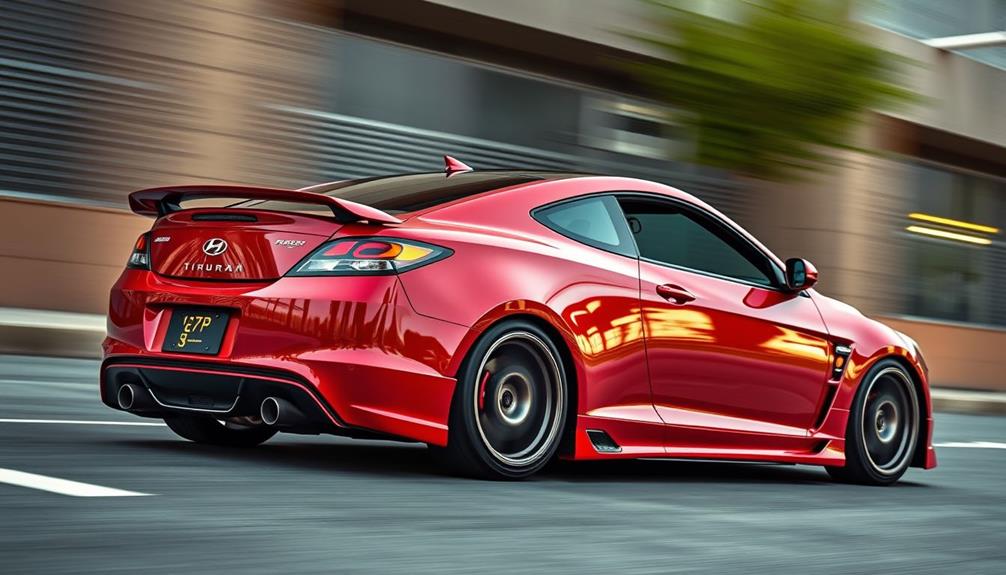
When it comes to elevating your Hyundai Tiburon's performance, several vital upgrades can make a considerable difference. To truly transform your ride into a performance icon, consider these key modifications that notably boost horsepower and torque:
- Turbocharger Installation: This upgrade can drastically increase your engine's output, providing an exhilarating driving experience.
- Exhaust System Enhancements: Upgrading your exhaust system not only improves airflow but also adds a deeper, sportier sound to your Tiburon.
- Suspension Upgrades: Investing in camber kits and big brake kits enhances handling and stopping power, ensuring your performance upgrades are supported.
A well-balanced modification plan is essential, with recommended investments around $15,000 for substantial engine tuning.
Don't forget that regular maintenance and proper tuning are necessary to sustain these performance upgrades, especially when dealing with increased boost levels from turbo setups.
Additionally, weight reduction measures, like carbon fiber hoods, can further enhance your Tiburon's performance, making them a valuable addition to your overall upgrade strategy.
With these vital modifications, you'll be well on your way to achieving an impressive, high-performance sports coupe.
Air Intake Systems and Forced Induction
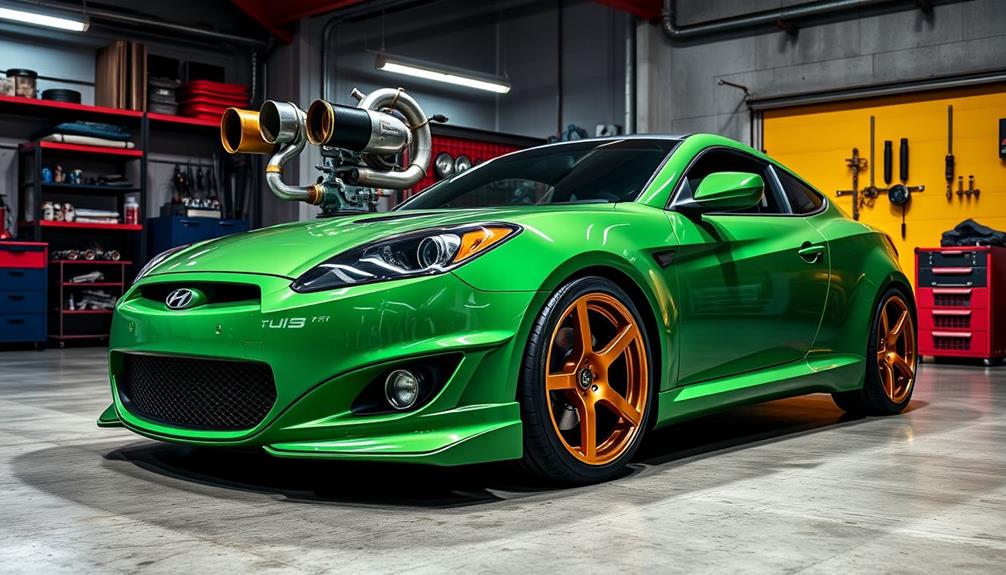
When tuning your Hyundai Tiburon, upgrading to a cold air intake can deliver denser air for better combustion, giving your engine a noticeable boost.
You'll also want to ponder whether a turbocharger or supercharger fits your performance goals, as each offers unique benefits.
Don't forget, a high-quality exhaust system is essential for maximizing the gains from any forced induction setup you choose.
Cold Air Intake Benefits
Installing a cold air intake (CAI) system can dramatically enhance your Hyundai Tiburon's performance by delivering denser, cooler air to the engine. This improvement leads to better combustion efficiency and overall power gains, especially when you're considering forced induction setups.
Compared to warm air intake (WAI) systems that pull in hot air from the engine bay, a CAI keeps your engine cooler and more efficient.
Here are some key benefits of installing a CAI:
- Increased Horsepower: Experience noticeable power gains, particularly when paired with a turbocharger.
- Improved Throttle Response: With better airflow, your throttle body works more efficiently, giving you a more responsive driving experience.
- Enhanced Engine Efficiency: Properly designed CAI systems can boost airflow by 10-20%, maximizing your Tiburon's performance potential.
To maximize the benefits of your CAI, consider upgrading your exhaust system for peak airflow.
Additionally, regular maintenance and cleaning of the CAI filter are essential to maintain airflow efficiency and prevent any degradation in engine performance.
With these upgrades, you'll truly transform your Tiburon into a performance icon.
Turbo Vs. Supercharger Options
Upgrading your Hyundai Tiburon's performance often leads to the choice between turbocharging and supercharging options for forced induction. Currently, turbocharging is the preferred method for the I4 Tiburon due to limited supercharger options and the difficulty in sourcing them.
Turbo systems can greatly boost horsepower and torque, providing a major performance enhancement when installed and tuned correctly. However, to maximize these gains, you'll need essential modifications, including upgraded air intake and exhaust systems.
When considering turbo kits, keep in mind that installation complexity varies by brand, so factor in the installer's experience to achieve the best results. A cold air intake (CAI) is particularly beneficial for forced induction setups. It delivers denser, cooler air, enhancing combustion efficiency compared to warm air intakes that pull in heated air from the engine bay.
Engine tuning is critical for maximizing your Tiburon's performance. Proper tuning affects airflow, fuel delivery, and exhaust efficiency, ensuring reliable engine operation under increased boost levels.
Essentially, if you want to transform your Tiburon into a performance icon, focus on turbocharging and precise engine tuning for the best results.
Exhaust System Importance
A well-optimized exhaust system is imperative for maximizing your Hyundai Tiburon's performance, especially when you're diving into forced induction upgrades. Upgrading your exhaust system enhances exhaust flow, which is essential for your engine's efficiency. A performance exhaust reduces back pressure, allowing your turbocharger to spool more effectively, ultimately increasing horsepower and torque outputs.
When considering an exhaust system, keep these key factors in mind:
- Larger diameter exhaust pipes improve airflow and reduce restrictions.
- High-flow catalytic converters enhance performance while meeting emissions standards.
- Proper maintenance prevents leaks that can hinder performance gains from your forced induction setup.
Pairing an aftermarket exhaust with a cold air intake can create a powerful synergy, leading to more efficient combustion and even greater performance.
Regularly checking your exhaust system for any issues is important, as leaks or blockages can negate the benefits of your upgrades. Investing in a quality exhaust system won't only boost your Tiburon's performance but also elevate your driving experience to a whole new level.
Don't overlook this critical component in your tuning journey!
Common Engine Issues

While driving your Hyundai Tiburon, you might notice some common engine issues that can affect performance and comfort. One prevalent issue is engine vibration at idle, especially around 850 RPM, which often worsens when the A/C is running. To alleviate this, you may need to increase the RPM to around 1000 temporarily for smoother operation.
Another sign of trouble is a drop in RPM or stalling after acceleration, suggesting potential problems with components like the CKP and MAP sensors. Grounding kits can be a great investment here, as they help improve engine idle stability, reducing those annoying vibrations.
Here's a quick overview of common engine issues and solutions:
| Issue | Symptoms | Solutions |
|---|---|---|
| Engine vibration at idle | Rough idle, noticeable shaking | Install grounding kits |
| RPM drop after acceleration | Stalling, poor acceleration | Inspect CKP/MAP sensors |
| Poor performance | Inconsistent power delivery | Verify proper tuning |
Proper tuning, focusing on airflow, fuel delivery, and exhaust efficiency, is crucial to prevent these issues and maximize your Tiburon's performance.
Transmission Concerns and Performance Upgrades
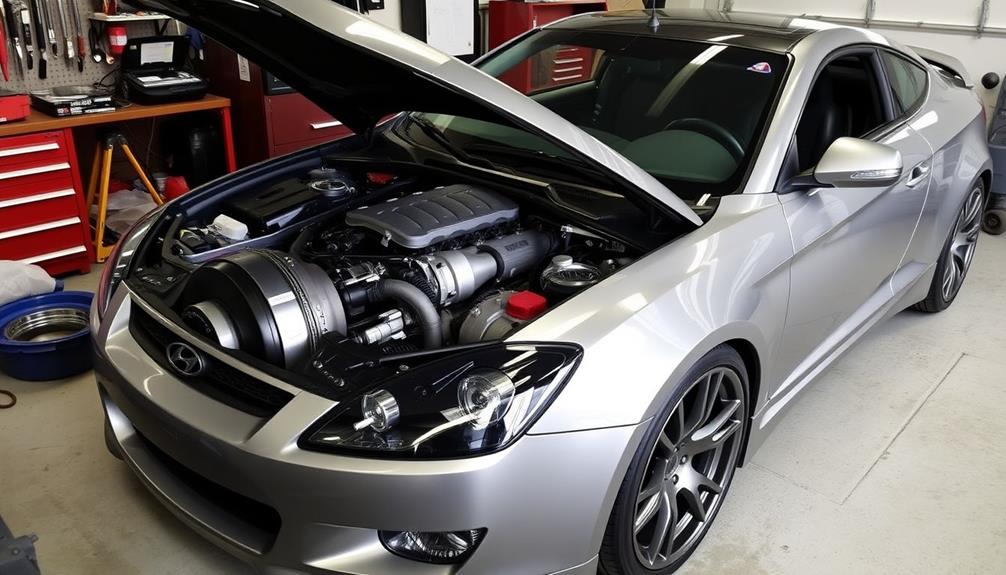
Engine performance isn't the only area that can impact your Hyundai Tiburon's overall driving experience; transmission concerns also play a significant role. If you're experiencing transmission issues, like a grinding noise during high RPM shifts from 1st to 2nd gear, it's crucial to address them promptly. Such sounds often indicate wear or misalignment that needs attention.
To enhance your Tiburon's transmission performance, consider these key upgrades:
- Bleed the clutch line: This can improve clutch engagement and shifting performance.
- Use the right fluid: Opt for 2.23 quarts of Redline MT90 and 0.3 quarts of Lucas stabilizer for peak operation.
- Upgrade suspension and brakes: Basic performance upgrades like improved suspension components and brake systems help mitigate transmission strain during high-stress driving.
Implementing these performance upgrades not only improves your Tiburon's driving dynamics but also enhances its competitive edge against modified vehicles.
Budgeting for Modifications

When planning modifications for your Hyundai Tiburon, careful budgeting is vital to avoid unexpected expenses that can quickly add up. Major engine tuning and upgrades can cost around $15,000, which might surpass your initial vehicle investment.
So, it's imperative to start by prioritizing essential upgrades like suspension, brakes, intake, and exhaust. This balanced approach guarantees you lay a solid foundation for performance enhancements.
Don't overlook shipping costs for aftermarket parts; they can sometimes exceed the part's value. As a result, factor these expenses into your overall budget.
Evaluating the cost versus performance gains for each modification is significant. This helps prevent overspending while making sure that every dollar spent translates into tangible performance improvements.
Collaborating with experienced tuners can streamline the modification process. Their expertise can reduce unnecessary expenses and help achieve ideal results without compromising quality.
Remember, budgeting for modifications isn't just about the upfront costs; it's about planning for the long term, making sure that your Tiburon becomes the performance icon you envision without breaking the bank.
Frequently Asked Questions
Can You Modify a Hyundai Tiburon?
Yes, you can definitely modify a Hyundai Tiburon! By adding turbo systems, upgrading air intakes, and enhancing suspension, you'll greatly improve performance. Just remember to budget properly for all essential modifications to achieve great results.
Is a Hyundai Tiburon a Fast Car?
You might think the Hyundai Tiburon's just an ordinary ride, but with the right upgrades, it transforms into a speed demon. It can easily surprise you, delivering exhilarating performance that rivals more powerful sports cars.
Is a Hyundai Tiburon a Sports Car?
You'll find the Hyundai Tiburon fits the sports car category well. Its sleek design, agile handling, and performance-oriented features make it an exciting choice for anyone looking to enjoy a spirited driving experience.
Is a Hyundai Tiburon a JDM Car?
You might consider the Hyundai Tiburon a JDM car due to its design, performance characteristics, and popularity among enthusiasts. Its tuning potential aligns with traditional JDM vehicles, making it a favorite in the tuning community.
Conclusion
In summary, tuning your Hyundai Tiburon can turn your sports coupe into a roaring beast on the road. By exploring turbocharged systems, air intake upgrades, and addressing common engine issues, you can release its full potential. Stay ahead of market trends and keep an eye on future developments to guarantee your ride remains a performance icon. With careful budgeting and the right modifications, your Tiburon will not just stand out; it'll leave the competition in the dust! If you’re looking to take your car to the next level, upgrading your Kia Spectra 2006 with performance-enhancing modifications can also significantly improve its power and speed. Consider investing in aftermarket exhaust systems, suspension upgrades, and engine tuning to elevate its overall performance. With the right enhancements, your Kia Spectra can also become a force to be reckoned with on the road.


